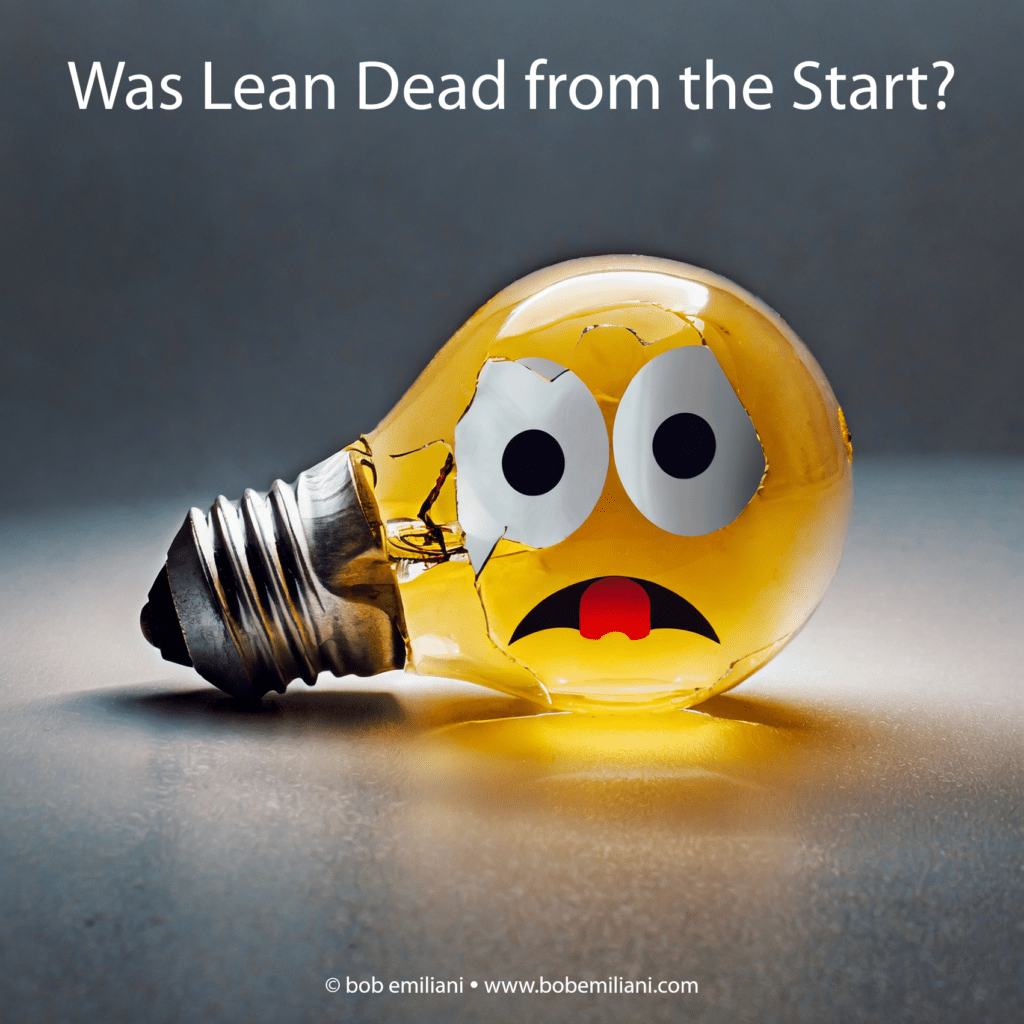
Nobody knew at the time when the term “Lean” was coined by John Krafcik in 1988, that Lean management was dead from the start due to the crushing weight of classical management.
Instead, everyone was overflowing with optimism — blind optimism, as it turns out — about this great new idea, Lean, and the dream of converting companies in every industry from classical management to Lean management. But, as is often the case, optimism soon gave way to reality. So what went wrong? Here are some relevant facts.
In going about their work, the early Lean promoters and influencers:
- Did not study the history of progressive management. Consequently, they did not learn about the great difficulty that Scientific Management’s top promoters and influencers encountered in trying to persuade CEOs to abandon the old ways of leading and managing. And that’s just one of many problems that are strikingly similar to what Lean has long faced.
- Did not realize that big companies were the wrong target audience for TPS and The Toyota Way given that classical management is deeply entrenched in those organizations. The origins of TPS and The Toyota Way were in a small start-up company, and so that would have been a better target audience decades ago.
- Did not recognize how deeply committed top leaders were to the status quo and classical management, one generation after another.
- Did not understand how weak their logical arguments were in the face of top leaders’ spiritual preconceptions and beliefs about themselves, their work, and their social status.
- Did not concern themselves with identifying the categories (n = 8+) and types of preconceptions (n = 100+) that inform top leaders’ commitment to the status quo and classical management — truly, the starting point for the kind of change envisioned by the early Lean promoters and influencers.
- Did not realize that while all top leaders want to improve business efficiency, the ways they do that are rooted in the trustworthy and dependable methods of the past. Consequently, most top leaders have little interest in Lean or its antecedent, the Toyota Production System and The Toyota Way.
- Did not understand past or recent phenomena associated with classical management such as disinterest in developing people (employees) to solve local and systemic problems, disinterest in eliminating waste (waste being a feature of classical management, not a bug), layoffs at any time for any reason, the loosening of merger and acquisition rules, high turnover of top leadership, financialization, etc.
- Did not understand the ancient Institution of Leadership and System of Profound Privilege, and top leaders’ duty to preserve and expand them, and that doing so was far more important than whatever additional efficiency, growth, profit, market share, or employee engagement might come from Lean.
- Did not recognize that the social, financial, economic, political, business, and legal thinking, rules, and systems, which have long been in place to service the needs of companies, are tailored to classical management. Most top leaders are not interested in fighting these systems, especially since they richly benefit from them.
The consequence of this is the widespread (global in scale) use of “Lean tools” for problem-solving in classically managed organizations and very few Lean transformations among the 335 million or so businesses worldwide.
Should the original Lean promoters and influencers have known about the above list of relevant facts at the start, 35 years ago (50 years ago if you begin counting when the business world first became aware of TPS)? Some of them, yes, others, no. But, over time they should have gained awareness of all of them and started to take action as this knowledge accrued and became more widely known.
Perhaps the next generation will do better, or maybe some later generation who is more committed to the science of learning from past mistakes.
Interested to learn more about the relevant facts listed above? Read these trailblazing books.
“History is strewn with the wreckage left by well-motivated individuals and groups, shattered by forces they did not comprehend and could not control.” – Douglas F. Dowd (1919-2017), Sociologist
